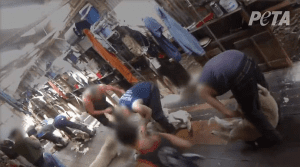 SHEARING contractors have been reminded to reduce animal welfare risks and be vigilant in worker supervision after a South Australian shearer was banned for two years over sheep cruelty charges.
SHEARING contractors have been reminded to reduce animal welfare risks and be vigilant in worker supervision after a South Australian shearer was banned for two years over sheep cruelty charges.
A Lucindale shearer was last week banned from shearing sheep or being in charge of any farm animal in Victoria for two years, after pleading guilty to four animal cruelty offences relating to shearing in a north west Victorian shearing shed three years ago.
Click here to get Sheep Central story links sent to your email inbox.
Five other shearers are due to face charges in Victorian courts next year and Agriculture Victoria has sent warning and advisory letters to several other workers as a result of video footage obtained by animal rights group PETA in shearing sheds in Victoria, New South Wales and South Australia in 2013.
The Shearing Contractors Association of Australia has emailed details of the court action to remind its members of the need to be vigilant in worker supervision, to work with their clients to improve their workplace environments, and reduce ‘risk’ factors that may lead to animal welfare issues.
SCAA secretary Jason Letchford said some of these issues were identified and addressed in the development of the ‘shared responsibility’ poster for the shearing industry, developed with WoolProducers Australia, Australian Wool Innovation and the Australian Wool Exchange. About 40,000 copies were distributed to wool growers and shearing contractors earlier in 2016.
Mr Letchford said the association is concerned that a member could potentially be liable for their employees’ behaviour towards animals, but the association does not believe there is a single cause of animal welfare issues. The shed poster is initially focussed on assisting employers to deal with drugs and alcohol in the workplace.
“To this end, the SCAA is working as part of a stakeholder group that includes wool growers via WoolProducers Australia, the National Farmers Federation and workers through the Australian Workers Union.
“The group is looking at reducing the impact of drugs and alcohol on the industry, that appear to be one of the ‘risk’ factors that contribute to animal welfare issues,” he said.
Mr Letchford said reducing the use of drugs and alcohol in the industry has been prioritised as having potential to reduce future incidences of animal harm. It also aligns with an industry goal of ‘zero harm’ to employees, in and out of the work place.
The industry group aimed to develop education materials and training to assist contractors and growers prevent workers from being under the influence of drugs and alcohol in the workplace, and identify and help any employees affected.
WoolProducers Australia does not condone cruelty
WoolProducers Australia chief executive officer Jo Hall agreed the Lucindale shearer case was a warning to shearers to treat sheep and others animals with care.
“This is enforcing what is legally in place to ensure that people handling livestock must not do so in a cruel manner.
“WPA does not condone animal cruelty and anybody found doing so has no place in the wool industry as they are jeopardising the reputation of the vast majority of wool growers and shearers who do the right thing every day,” she said.
“Animal welfare is a key priority for our industry and one we take very seriously.
“Shearing is an extremely difficult job but it is done so across the country in varying conditions at least five days a week but there is never a need for cruelty to inflicted on an animal.”
Ms Hall said the wool industry already strong commitment to animal welfare was indicated by WPA’s coordination of the shared responsibility poster for the shearing industry, with its list of actions that must be undertaken by both the wool grower and the shearer to ensure the shearing process is conducted in a correct manner for humans and animals.
“While this is an unfortunate and somewhat isolated case, if there is any good to come from it, it is hoped that this case makes people aware at a grass-roots level that there are ramifications for animal cruelty and that it is not accepted by industry or the general public.
“Like most issues in the wool industry, animal welfare is a case of continuous improvement and industry will continue to strive for improvements as new techniques, technologies and products are developed.”



Full sheep is a problem all over Australia. Also bad cases of daggy sheep. These two issues cause more frustration to shearers than the effects of drugs or alcohol.
When are the growers going to be put in the firing line? A lot of accommodation is still sub-standard. Wool sheds often need repairs that are overlooked. With these above problems the shearing staff are expected to do a top job, no matter what the situation. Why is the emphasis always placed on the shearer?